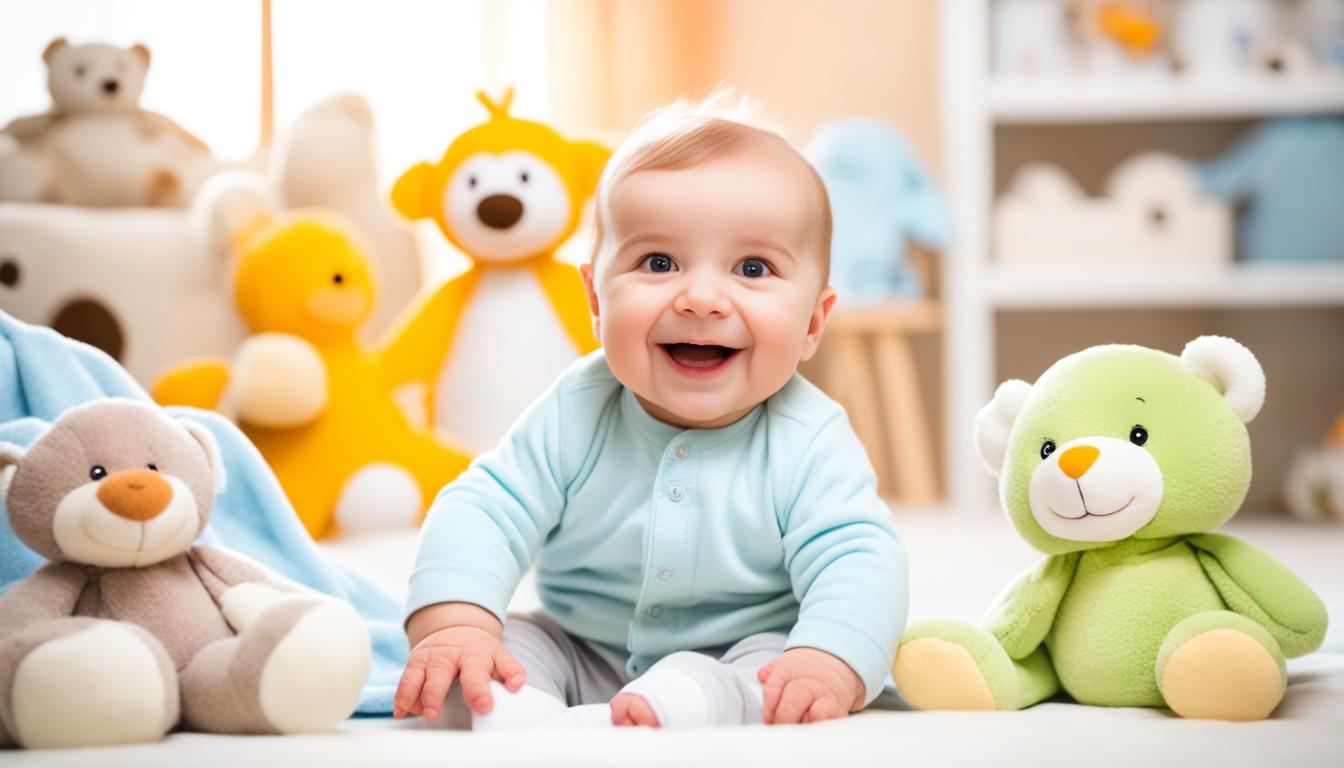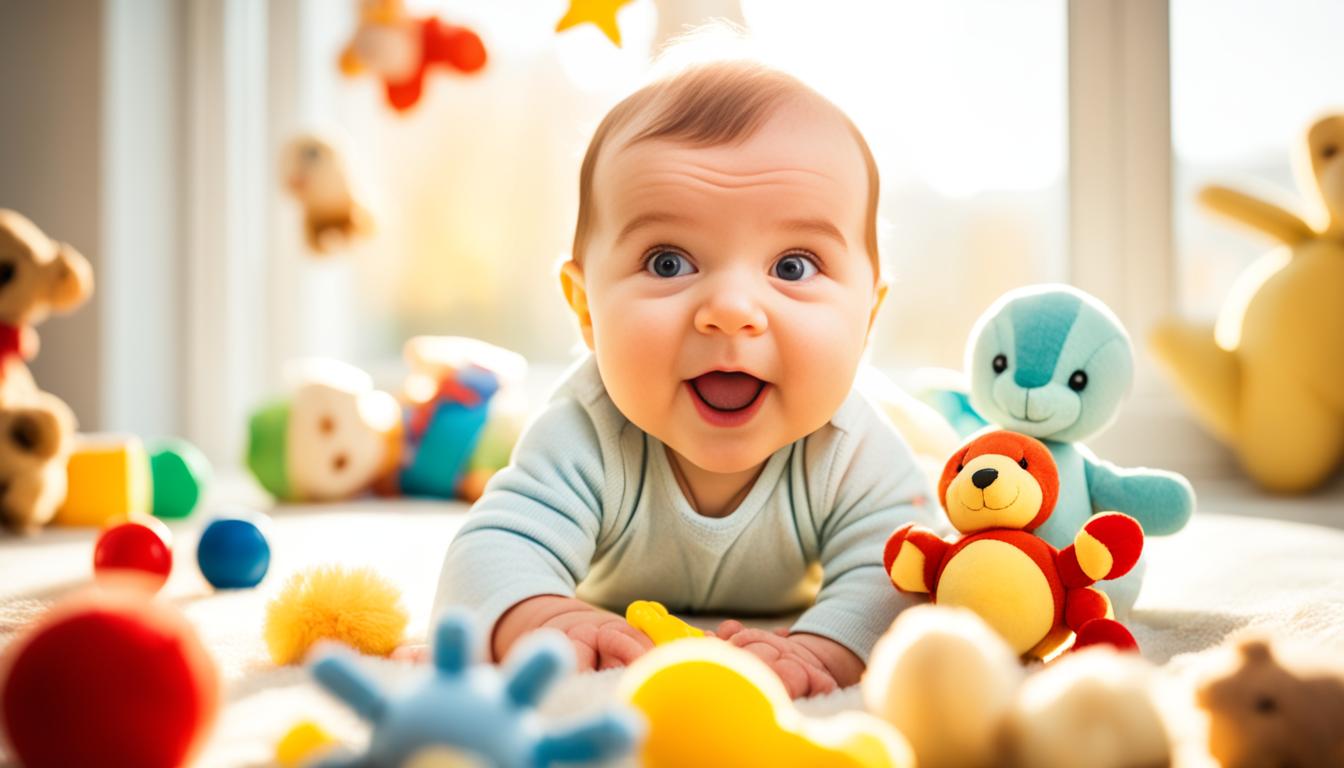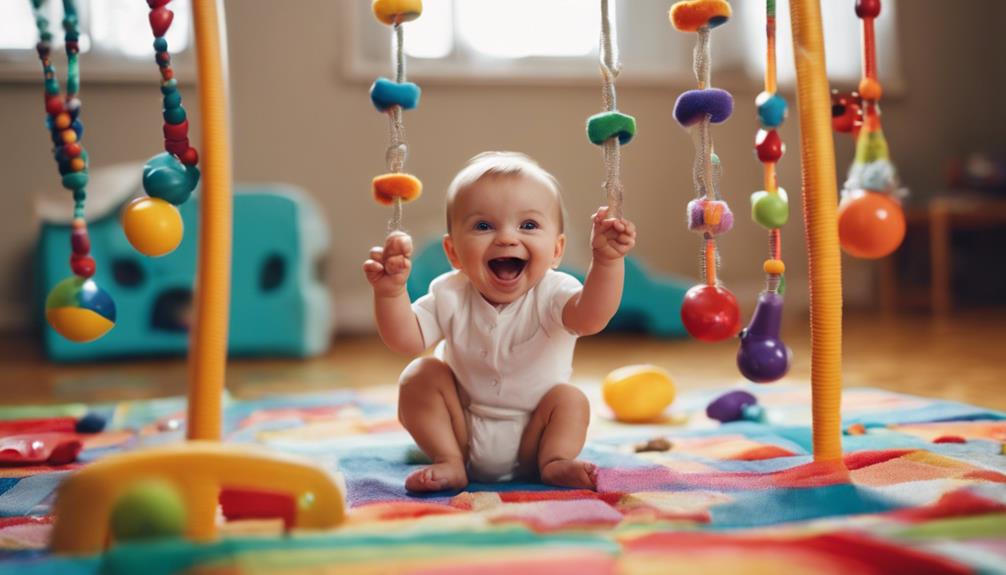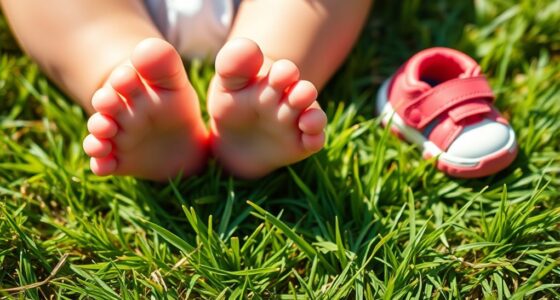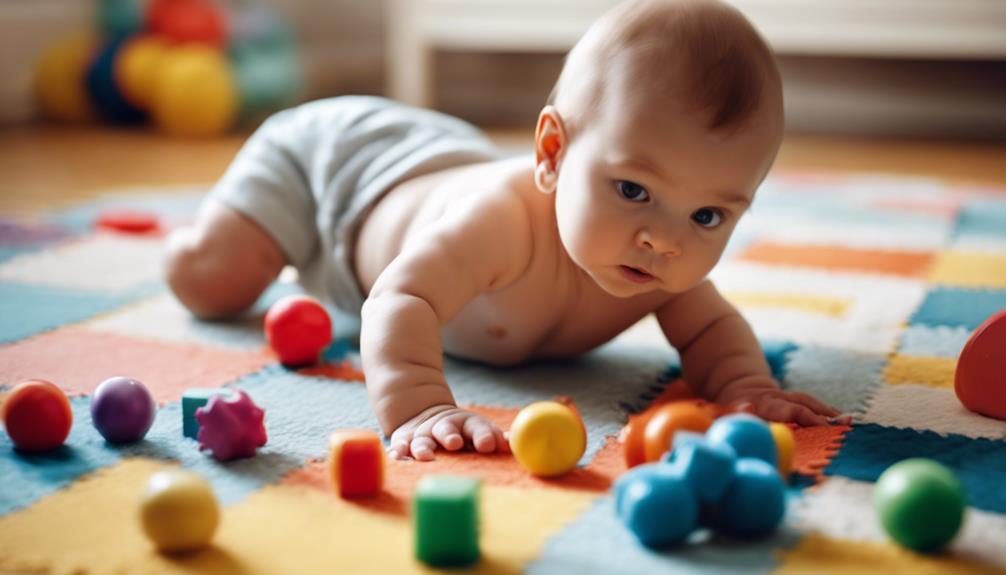Imagine the feeling of cradling your newborn baby in your arms, taking in their delicate fingers wrapping around yours, and looking into their innocent and curious eyes. As you connect with their gaze, a rush of emotions floods through you – love, responsibility, and a strong urge to care for and shield this precious life. You understand that this tiny bundle of joy relies on you for everything, but where do you even start?
Your baby’s social-emotional development is a journey that starts from the moment they are born. It is the process through which they learn to form close relationships, experience and express emotions, and explore the world around them. It is a crucial aspect of their overall development that will impact their health, happiness, and learning capabilities throughout their lives.
Research shows that infants and toddlers who have nurturing and responsive relationships with adults are better able to regulate their emotions, a crucial skill for social-emotional development1. These early relationships lay the foundation for all future social interactions and have a profound impact on your baby’s emotional well-being.
Social-emotional milestones in infants and toddlers can vary in the age at which they are achieved, emphasizing the uniqueness of each child’s development1. By 9 months, infants start showing varied facial expressions like happiness, sadness, anger, and surprise, indicating their developing emotional range1. They display a preference for certain people and items by 12 months, signifying emerging social attachments1. Around 15 months, toddlers begin to mimic other children at play and show affection to objects like dolls, demonstrating early social interaction skills1. By 24 months, toddlers exhibit behaviors such as noticing when others are upset, imitating adults, showing independence, and exploring their surroundings, which are key indicators of social-emotional development1. At 30 months, they start playing alongside peers and follow simple routines independently, showcasing their evolving social skills and ability to engage with others1. By 36 months, toddlers show signs of empathy, forming friendships, expressing affection without prompt, and adapting to routine changes, underscoring advanced social-emotional growth1.
During the first few months of life, babies seek comfort and support from their caregivers, developing trust and understanding of emotional responses through consistent caregiving2. They start to copy facial expressions and respond to them, such as giving a big smile or raising eyebrows in response to caregivers2. As they grow older, babies aged 7-9 months may exhibit fear of strangers, loud noises, or new situations, requiring comfort from caregivers2. By 9-12 months, they may recognize some words and begin to express themselves, laying the foundation for understanding emotions like happiness and sadness2.
As a parent, you play a crucial role in nurturing your baby’s social-emotional development. By forming close and secure relationships, helping them manage emotions, encouraging exploration, observing and responding to their needs, and supporting their skills development, you lay the foundation for healthy social-emotional well-being. These building blocks will serve them for life.
Key Takeaways:
- Nurturing and responsive relationships with adults are crucial for infants and toddlers to regulate their emotions and foster social-emotional development1.
- Social-emotional milestones in infants and toddlers vary, emphasizing the uniqueness of each child’s development1.
- Infants display a range of emotions and develop social attachments in their first year1.
- Toddlers exhibit behaviors that indicate social-emotional development, such as imitating others, showing independence, and engaging with peers1.
- Supporting your baby’s social-emotional development includes providing comfort, fostering exploration, and being responsive to their needs2.
Forming Close and Secure Relationships
Babies form secure relationships early in their lives by building bonds with family members, getting help in managing their feelings, and having opportunities to safely explore.
Parents play a major part in developing these relationships by responding to their baby’s needs, following their lead, and showing delight in their activities.
Avoiding scary or harsh behavior is also important in building trust and maintaining a secure base.
Research shows that nurturing emotional development and promoting baby social-emotional wellbeing is crucial during these early years.1
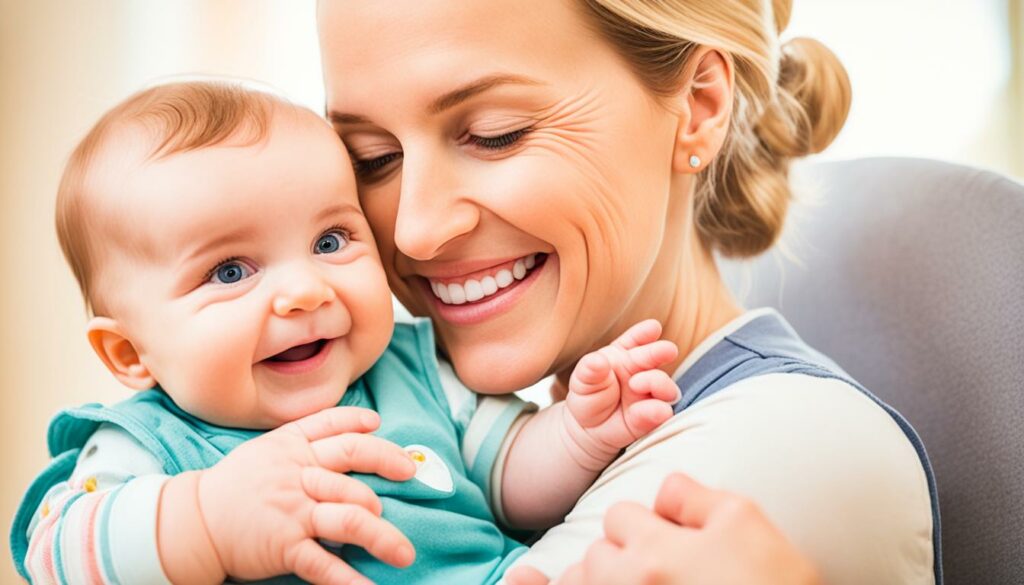
The formation of close and secure relationships is a key aspect of nurturing emotional development in babies. These relationships provide a foundation for healthy social-emotional development throughout their lives.
By responding sensitively to a baby’s needs, parents create a sense of security and emotional safety, allowing the baby to explore and learn about the world around them with confidence.
“Secure relationships provide a sense of safety and security for babies, allowing them to develop trust, emotional regulation, and social skills.”1
When babies receive nurturing and responsive care, they learn that their needs will be met, leading to a sense of trust in their caregivers and a secure base from which they can explore and grow.
Positive relationships with caregivers in infancy and toddlerhood not only contribute to promoting baby social-emotional wellbeing but also have long-term implications for their development outcomes.
Secure relationships formed in early childhood have been associated with better learning outcomes, improved emotional regulation, and enhanced social skills later in life.1
Activities to Promote Close Relationships
There are various activities that parents can engage in to nurture their baby’s emotional development and promote the formation of close relationships:
- Engage in face-to-face interactions: Making faces and imitating your baby’s facial expressions can be a fun and engaging way to build a bond and encourage social interaction.
- Participate in interactive play: Playful interactions, such as peek-a-boo or tickling games, help develop a sense of joy and shared experiences.
- Offer choices: Providing simple choices, such as which toy to play with or what to wear, allows babies to make decisions and feel a sense of empowerment.
These activities support nurturing emotional development and foster secure relationships between parents and their babies, laying the groundwork for their social-emotional wellbeing.
| Age | Social-Emotional Milestones |
|---|---|
| 0-3 months | – Begins to recognize familiar faces – Smiles and coos in response to others – Shows interest in social interactions with adults |
| 4-6 months | – Begins to show preference for familiar people – Engages in simple social games, like peek-a-boo – Responds to own name being called |
| 7-9 months | – Displays stranger anxiety – Seeks comfort from caregivers – Shows affection towards familiar people |
| 9-12 months | – Begins to imitate actions and gestures – Waves goodbye and plays simple games like pat-a-cake – Uses language and vocalizations to communicate |
It’s important to remember that developmental milestones may vary among individual children, and cultural influences can also shape social-emotional development.13
Parents are encouraged to refer to resources such as Infant Social and Emotional Checklists and professional guidance to ensure they are supporting their baby’s social-emotional development appropriately.2
Helping Babies Manage Emotions
Helping babies manage their emotions is an important aspect of their social-emotional development. Comforting and providing warmth when they are distressed helps them learn to soothe and calm themselves. This builds their ability to regulate their emotions and promotes infant emotional regulation2. Giving babies words to express their feelings and letting them know that all feelings are okay helps them understand and manage their emotions effectively. Parents can teach alternative ways of expressing big feelings and provide a safe space for babies to talk and share their emotions4.
Responsive caregiving involves understanding and meeting a baby’s needs, such as providing appropriate support for tasks the baby wants to do but cannot yet accomplish independently4. By responding to their cues with comfort and care, parents reaffirm their presence and help babies feel safe and secure. This enhances their ability to manage emotions and develop a sense of trust4.
“Comforting and providing warmth when babies are distressed helps them learn to soothe and calm themselves.”
Showing affection and providing nurturing behaviors such as physical touch, comforting, and verbal interactions contribute to a baby feeling loved and secure. These behaviors play a crucial role in emotional development and help babies develop a strong sense of attachment to their caregivers4. By reassuring babies through responsive caregiving, parents establish predictable routines that enhance the child’s sense of safety and trust4.
Culturally relevant activities and materials also play a significant role in shaping a baby’s identity and self-esteem. Inclusive practices that embrace diverse cultural backgrounds provide babies with a sense of belonging and strengthen their social-emotional well-being4.
Overall, helping babies manage their emotions involves creating a nurturing and supportive environment where they feel safe to express their feelings. By responding to their needs, providing affection, and establishing predictable routines, parents can lay the foundation for healthy emotional development and promote their baby’s social-emotional well-being.
Promoting Baby Social-Emotional Wellbeing
| Age Range | Development Milestones |
|---|---|
| 4-6 months | Babies start copying expressions and responding to people, indicating early social interaction skills2. |
| 7-9 months | Babies might show fear of strangers and loud noises, a normal developmental stage2. |
| 9-12 months | Babies begin recognizing words and forming strong bonds with caregivers, showcasing cognitive and emotional growth2. |
| Birth-2 months | Newborns seek comfort and care from caregivers, learning to trust and communicate non-verbally2. |

Encouraging Exploration
Exploration is a crucial aspect of early childhood development. Babies naturally use all their senses to engage with the world around them, including the act of putting objects in their mouths. This exploration serves as a catalyst for their cognitive and sensory development, fostering their understanding of their environment and honing their early childhood social skills.
Creating a safe and stimulating environment is essential to encourage and support your baby’s exploration. It’s important to remove any small objects that may pose a choking hazard and ensure that the surroundings are free from potential dangers. This allows your baby to freely explore their surroundings, promoting their curiosity and expanding their knowledge about the world. By ensuring a safe exploration space, you contribute to their emotional and physical well-being while nurturing their social development.
As your baby actively explores, it’s essential to provide encouragement and support. When they make new discoveries or reach milestones, such as grasping objects or reaching for toys, delight in their accomplishments. Praise their efforts and achievements, as this positive reinforcement reinforces their sense of security and fosters their self-confidence2. By warmly welcoming them when they return to you, you reinforce their secure attachment and provide a sense of safety that forms the foundation for their social-emotional development.
Demonstrate an active interest in their discoveries, ask open-ended questions, and engage in interactive play. This interaction helps to develop their early childhood social skills and promotes bonding and connection with you as their caregiver. By actively engaging in their exploration, you build a strong parent-child relationship, which plays a vital role in their emotional and social development.
In supporting your baby’s exploration, it’s important to strike a balance between providing guidance and allowing them the freedom to learn independently. While it’s essential to set boundaries and establish what is safe and appropriate, resist the urge to overly control their exploration. This independence allows them to develop a sense of agency and self-confidence, contributing to their overall social and emotional growth.
Encouraging exploration is an opportunity to witness your baby’s growing curiosity and their unique experiences. By nurturing their early childhood social skills and providing a safe and supportive environment, you empower them to develop a strong foundation for their social-emotional well-being and future interactions with the world around them.
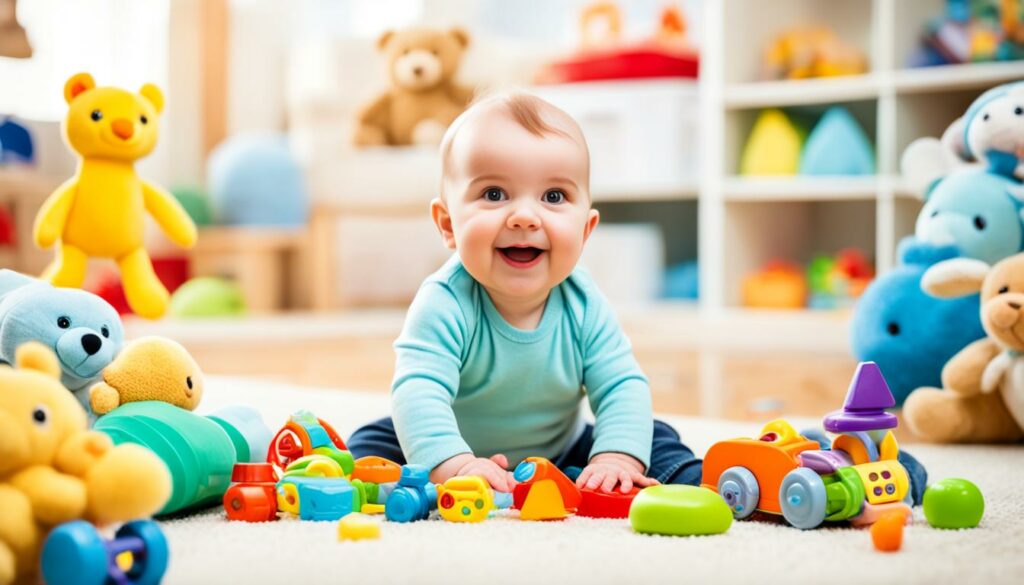
The Role of Parents in Social-Emotional Development
As a parent, you play a crucial role in promoting your baby’s social-emotional wellbeing5. By nurturing their emotional development and providing a supportive environment, you can help your baby thrive in their social interactions and emotional experiences. Here are some key ways in which parents influence their baby’s development:
- Building a bond: Establishing a strong bond with your baby is the foundation for their social-emotional development. By showing love, care, and responsiveness, you create a secure attachment that enables your baby to feel safe and explore the world around them.
- Responding to needs: When you respond promptly and sensitively to your baby’s needs, whether it’s feeding, changing, or soothing, you foster a sense of trust and security. This helps them develop a positive outlook on relationships and build social-emotional skills.
- Being affectionate and nurturing: Expressing affection through cuddling, hugging, and gentle touch reinforces your baby’s sense of being loved and valued. These nurturing interactions contribute to their emotional wellbeing and promote positive social interactions.
- Helping resolve conflicts: Conflict resolution is an important skill for social-emotional development. By modeling problem-solving strategies and teaching your baby how to manage conflicts in a constructive way, you equip them with valuable skills for future social interactions.
“Parenting is the greatest privilege and responsibility. By providing a caring and supportive environment, parents lay the foundation for their baby’s social-emotional development.”
Research has shown that a nurturing and responsive parenting approach has significant benefits for infants. It supports their emotional regulation skills, enhances their social interactions, and contributes to their overall well-being. Children who receive positive parenting experiences are more likely to develop healthy relationships, perform better academically, and have higher emotional intelligence6.
It’s important to remember that each baby is unique, and the way they develop socially and emotionally may vary. Being attuned to your baby’s cues, observing their behavior, and adapting your parenting style accordingly can further enhance their social-emotional development. When you provide a loving and supportive environment, your baby will have a solid foundation for healthy social relationships and emotional well-being throughout their lives.

| Statistics | Source |
|---|---|
| Many schools and preschools have been closed on and off for two years | 1 |
| Some families decided to delay enrolling their children in school | 1 |
| More than 167,000 children have lost a parent or primary caregiver to COVID | 1 |
| Children born during the pandemic are lagging developmentally | 1 |
| Parents are stressed out | 1 |
| COVID-19 is affecting children’s mental health | 1 |
| Racial and ethnic minorities and vulnerable children face amplified challenges | 1 |
| Many students are falling behind academically | 1 |
| Parents are concerned about their children’s social and emotional development and academic progress | 1 |
| Around 1 to 2 months of age, infants begin to smile socially in response to parental high-pitched vocalizations or smiles | 2 |
| Infants can use a distinct facial expression to express emotions in an appropriate context after 2 months of age | 2 |
| By around 5 months of age, infants can recognize their primary caregiver by sight | 2 |
| Between 6 to 12 months, effective attachment relationships are established with a responsive caregiver | 2 |
| Stranger anxiety emerges around this age as infants distinguish between the familiar and the unfamiliar | 2 |
| Around 8 months of age, joint attention skills develop, where infants look in the same direction as their caregivers and follow their gaze | 2 |
| Between 12 to 18 months, proto-imperative pointing emerges where infants request by pointing at the object of interest and integrating it with eye contact between the object and the caregiver | 2 |
| Around 18 months of age, children bring objects to show or give to the caregiver | 2 |
Observing and Responding to Your Child
As a parent, one of the most important aspects of promoting your baby’s social-emotional wellbeing is observing and responding to their behavior and individual way of approaching the world. By taking the time to really look and listen to your child, you can gain valuable insights into their needs and respond in a way that supports their emotional development1.
Every child is unique, and by observing them closely, you can better understand their cues and signals. Pay attention to their facial expressions, body language, and vocalizations, as these can provide valuable clues about how they are feeling and what they need. By being attuned to your child’s needs, you can respond promptly and appropriately, building a sense of trust and security1.
When children feel responded to and understood, it fosters their confidence and contributes to good self-esteem. By validating their emotions and acknowledging their experiences, you show them that their feelings are valid and important1. This helps them develop a positive sense of self and a healthy emotional foundation that will benefit them throughout their lives.
Additionally, by observing your child, you can gain valuable insights into their interests, preferences, and developmental progress. Pay attention to the activities and toys that capture their attention, as well as their interactions with others. This knowledge can guide your choices in providing enriching experiences and age-appropriate materials that foster their social and emotional growth12.
Remember, every child develops at their own pace, and it’s important to celebrate their individual milestones and achievements. By recognizing and acknowledging their progress, you can nurture their self-confidence and motivation to continue learning and exploring1.
Key Takeaways:
- Observing and understanding your child’s behavior is crucial for supporting their social-emotional development1.
- Pay attention to your child’s cues, such as facial expressions and body language, to better understand their needs1.
- Responding promptly and appropriately to your child’s needs builds trust and security1.
- By validating your child’s emotions, you help them develop a positive sense of self and good self-esteem1.
- Observing your child’s interests and interactions can guide your choices in providing enriching experiences12.
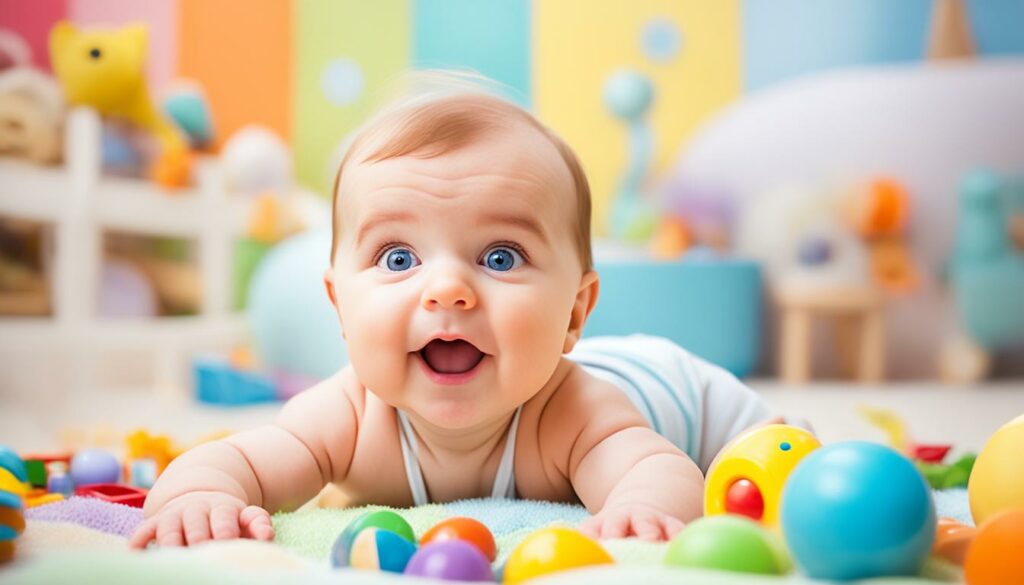
| Developmental Milestones | Age | Behaviors |
|---|---|---|
| Calms down when spoken to | 2 months | Smiles at people, cries when hungry or tired |
| Smiles to get attention | 4 months | Makes early noise sounds of laughter |
| Enjoys looking at self in the mirror | 6 months | Plays by grabbing foot |
| Is shy or clingy around strangers | 9 months | Reacts when you leave, smiles or laughs playing peek-a-boo |
| Plays games | 12 months | Lifts foot for shoe or sock, shows preference for certain people |
| Copies other children | 15 months | Claps when excited, shows affection |
| Explores alone | 18 months | Points to show something of interest, helps with dressing |
| Imitates others | 24 months | Shows independence, shows defiant behavior |
| Plays next to other children | 30 months | Follows simple routines independently |
| Calms down after you leave | 36 months | Notices other children, shows affection for friends |
Affection and Nurturing
Showing affection and nurturing your baby is not only a natural instinct but also provides the stimulation their growing brain needs. Touching, holding, comforting, and talking to babies communicate that they are special and loved. These interactions help babies develop trust, empathy, compassion, generosity, and conscience.
Nurturing emotional development is crucial in promoting baby social-emotional wellbeing1. By showering your baby with affection, you create a nurturing environment that supports their social and emotional growth2. Through gentle touches and cuddles, your baby learns to form strong emotional bonds with caregivers, establishing a sense of security and trust4.
Affectionate interactions not only provide emotional reassurance but also aid in your baby’s cognitive development1. By being responsive and attentive to your baby’s needs, you demonstrate that their emotions and feelings are valued, fostering their emotional intelligence2. Regular affectionate interactions, such as hugging, kissing, and verbal affirmations, help babies feel loved and valued4.
Creating a predictable routine for your baby can also enhance feelings of safety and security4. This consistent and structured environment allows your baby to develop a sense of stability and familiarity, which are vital for their emotional well-being.
Introducing your baby to their home culture through language, books, and music can positively impact their identity and self-esteem4. Cultural experiences help shape your baby’s understanding of the world and foster a sense of belonging.
Remember, affection and nurturing play a fundamental role in promoting your baby’s social-emotional development1. By providing a loving and caring environment, you are not only supporting their emotional well-being but also laying the foundation for their future social and emotional growth2.

| Statistical Data | Reference |
|---|---|
| Approximately 90% of a child’s social-emotional development is influenced by their early relationships with parents, relatives, and caregivers. | 4 |
| Responsive care is crucial, as it fosters a sense of security and trust in babies, contributing to healthy development. | 4 |
| Delighting in a baby’s discoveries and supporting their developing skills can boost their self-esteem and confidence. | 4 |
| Regular affectionate interactions, such as hugging, kissing, and verbal affirmations, help babies feel loved and valued. | 4 |
| Building a predictable routine for babies can enhance feelings of safety and security. | 4 |
| Introducing a child to their home culture through language, books, and music can positively impact their identity and self-esteem. | 4 |
Helping Your Child Resolve Conflicts
Toddlers are at an important stage of development, where they are beginning to become aware of themselves and their interactions with others. During this time, sharing and understanding others’ feelings can be challenging for them. It is crucial for parents to play a guiding role in their child’s social-emotional development by providing support and teaching important skills for conflict resolution7.
One way parents can help their toddlers navigate conflicts is by modeling positive social behavior. Children learn by observing, so when parents display effective conflict resolution techniques, it sets an example for their child to follow8. Additionally, providing guidance and teaching problem-solving skills can empower toddlers to control their impulses and find peaceful resolutions7. Parents can introduce tools like problem-solving baseball or smiley face ratings to guide their child in generating solutions and evaluating their effectiveness in conflict resolution8.
Teaching early childhood social skills through role-playing is another effective method to enhance communication during conflicts. Parents can engage in pretend play and encourage their child to express their feelings and thoughts. This practice helps children develop their communication skills and better understand appropriate responses in conflict situations8. Nonverbal communication is equally important, and parents can use this opportunity to teach their child about body language and facial expressions during conflicts8.
It is also essential for parents to provide clear expectations and structure in their toddler’s daily routine. Predictability and consistency can help prevent conflicts from arising in the first place. Visual schedules, such as daily schedules, can help children understand the sequence of events and reduce disappointment, conflict, and stress7. Implementing structured transitions and setting clear rules and expectations contributes to a positive environment, enabling toddlers to navigate social interactions more effectively7.
| Promoting Conflict Resolution Skills: | Statistical Data |
|---|---|
| Utilizing visual tools like feelings charts | 8 |
| Implementing the stoplight method | 8 |
| Using techniques like the emotion thermometer | 8 |
| Applying problem-solving baseball and smiley face ratings | 8 |
| Encouraging reflection and perspective-taking | 8 |
| Utilizing “I” statements and talking points | 8 |
| Practicing role-playing and nonverbal communication | 8 |
By helping toddlers control their urges and resolve conflicts, parents actively promote their child’s social-emotional wellbeing. The skills learned during early childhood, such as effective communication, problem-solving, and conflict resolution, lay the foundation for healthy social interactions in the future.
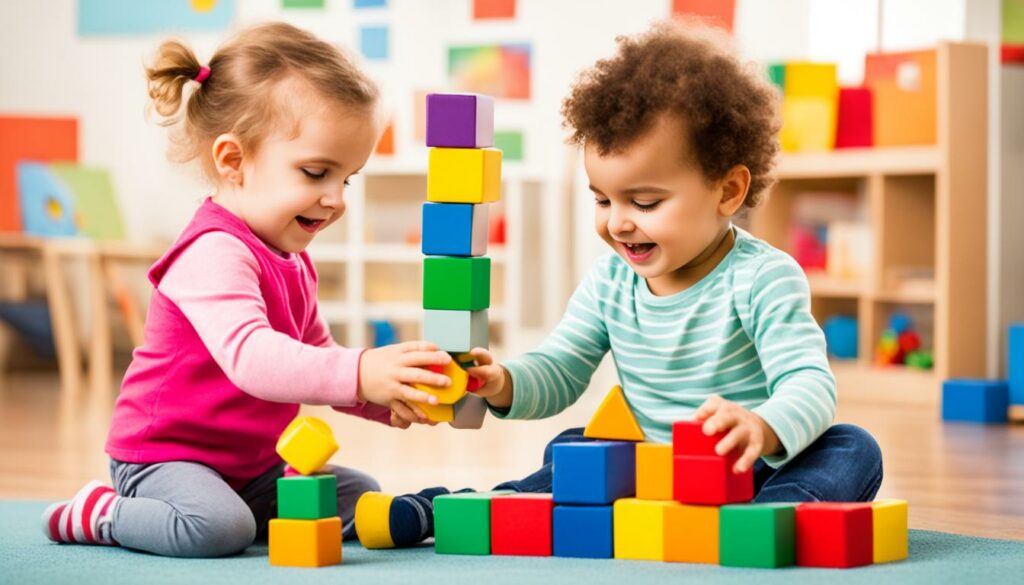
Supporting Your Child’s Skills Development
Supporting your child’s early childhood social skills is crucial for their overall social-emotional development and their ability to navigate relationships throughout life. By focusing on their development during these early years, you can lay the foundation for their future success.
“Babies start learning social and emotional skills from birth, as they begin interacting with caregivers”9. It’s never too early to nurture their development and provide them with the support they need.
Building strong social-emotional skills in your baby sets the stage for their success in school, work, and life. Kids with healthy social-emotional skills are more likely to thrive academically and have positive relationships with others9. Early experiences with family, caregivers, and peers shape their social-emotional growth, so it’s important to provide a nurturing and supportive environment for their development9.
As your child grows, their social-emotional development continues to be shaped by their experiences. It’s common for children to miss one or two social-emotional milestones during their development, but if your child is missing multiple milestones, it may be necessary to seek attention from a healthcare provider9.
When it comes to supporting your child’s skills development, following their lead and offering just enough support to challenge them without overwhelming them is crucial. Encourage exploration and provide opportunities for them to discover their capabilities and experience success. This builds their confidence and enhances their early childhood social skills9.
Parents play a crucial role in supporting their child’s social-emotional development. By providing a supportive and nurturing environment, you can foster their learning and encourage their efforts. Spending quality one-on-one time with your child, listening attentively, and reflecting their feelings are all ways to build trust and strengthen your relationship10.
Teachers also play a key role in promoting children’s social and emotional health. Building trusting relationships with students and conducting intentional teaching are essential for their development10. Using children’s books to help them identify characters’ emotions and relate experiences to their own can also significantly contribute to their emotional understanding10.
Supporting your child’s emotional development is just as important as supporting their cognitive development. Helping toddlers express their feelings in age-appropriate ways and supporting them in problem-solving are both crucial aspects of their emotional development11. Teaching them to resolve conflicts in healthy ways and helping them understand and manage their emotions are skills that will benefit them throughout their lives11.
Overall, supporting your child’s skills development is essential for their social-emotional wellbeing. By providing the necessary support, scaffolding their learning, and encouraging their efforts, you are helping them build strong early childhood social skills and laying the foundation for a bright future911.
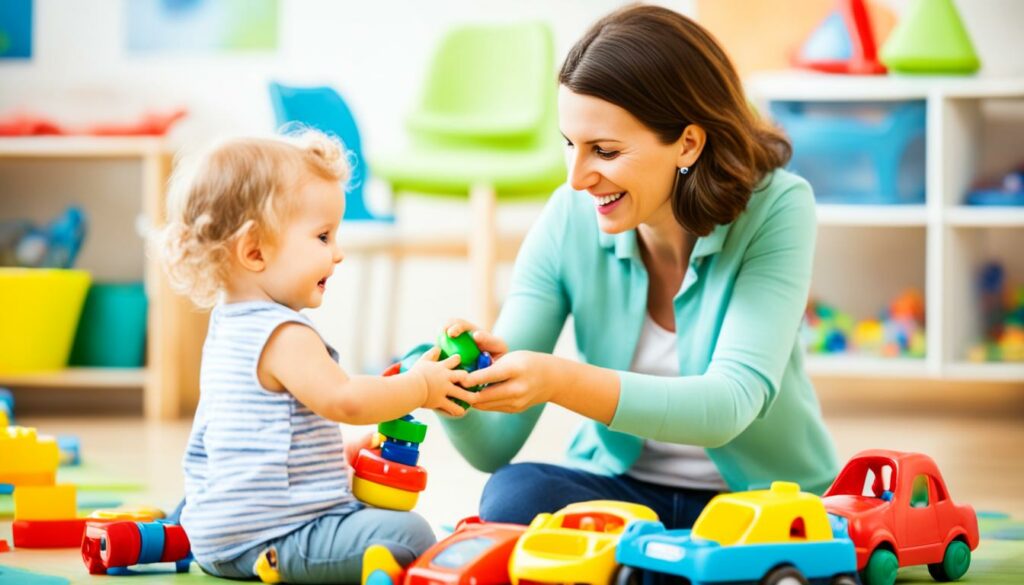
Conclusion
As a parent, you have a crucial role in nurturing your baby’s social-emotional development. By forming close and secure relationships, helping them manage their emotions, encouraging exploration, observing and responding to their needs, and supporting their skills development, you are laying the foundation for healthy social-emotional well-being112. These building blocks will serve them well throughout their life.
FAQ
What is social-emotional development in babies?
How can I help my baby form close and secure relationships?
What can I do to help my baby manage their emotions?
How can I encourage my baby’s exploration?
What role do parents play in their baby’s social-emotional development?
How can I observe and respond to my child’s needs?
Why is affection and nurturing important for babies?
How can I help my child resolve conflicts?
How can I support my child’s skills development?
Why is nurturing social-emotional development important for babies?
Source Links
- https://www.virtuallabschool.org/infant-toddler/social-and-emotional-development/lesson-2
- https://www.michigan.gov/mikidsmatter/parents/infant/social
- https://www.virtuallabschool.org/fcc/social-and-emotional-development/lesson-2
- https://www.zerotothree.org/resource/birth-to-12-months-social-emotional-development/
- https://nhsa.org/resource/five-ways-parents-can-support-childrens-development/
- https://www.ncbi.nlm.nih.gov/books/NBK534819/
- https://www.virtuallabschool.org/tcs/social-and-emotional-development/lesson-5
- https://childmind.org/article/teaching-kids-how-to-deal-with-conflict/
- https://pathways.org/topics-of-development/social-emotional/
- https://www.naeyc.org/resources/pubs/yc/mar2018/promoting-social-and-emotional-health
- https://www.zerotothree.org/resource/24-36-months-social-emotional-development/
- https://extension.okstate.edu/fact-sheets/nurturing-your-babys-social-and-emotional-growth.html

